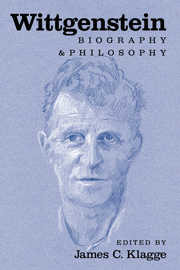Book contents
- Frontmatter
- Contents
- Contributors
- Editor's Preface
- Biography and Philosophy
- Wittgenstein
- Wittgenstein and the Mind's Eye
- Deep Disquietudes: Reflections on Wittgenstein as Antiphilosopher
- The Sleepy Philosopher: How to Read Wittgenstein's Diaries
- Letters from a Philosopher
- Wittgenstein and Reason
- Wittgenstein and the Idea of Jewishness
Was Wittgenstein a Jew?
Published online by Cambridge University Press: 27 March 2010
- Frontmatter
- Contents
- Contributors
- Editor's Preface
- Biography and Philosophy
- Wittgenstein
- Wittgenstein and the Mind's Eye
- Deep Disquietudes: Reflections on Wittgenstein as Antiphilosopher
- The Sleepy Philosopher: How to Read Wittgenstein's Diaries
- Letters from a Philosopher
- Wittgenstein and Reason
- Wittgenstein and the Idea of Jewishness
Summary
In my mind's eye, I can already hear posterity talking about me, instead of listening to me, those, who if they knew me, would certainly be a much more ungrateful public.
And I must do this: not hear the other in my imagination, but rather myself. I.e., not watch the other, as he watches me – for that is what I do – rather, watch myself. What a trick, and how unending the constant temptation to look to the other, and away from myself.
– (Wittgenstein, Denkbewegungen: Tagebücher 1930–1932/1936–1937, 15 November or 15 December, 1931Was Wittgenstein Jewish?
Did Ludwig Wittgenstein consider himself a Jew? Should we? Wittgenstein repeatedly wrote about Jews and Judaism in the 1930s (Wittgenstein 1980/1998, 1997) and the biographical studies of Wittgenstein by Brian McGuinness (1988), Ray Monk (1990), and Béla Szabados (1992, 1995, 1997, 1999) make it clear that this writing about Jewishness was a way in which he thought about the kind of person he was and the nature of his philosophical work. On the other hand, many philosophers regard Wittgenstein's thoughts about the Jews as relatively unimportant. Many studies of Wittgenstein's philosophy as a whole do not even mention the matter, and those that do usually give it little attention. For instance, Joachim Schulte recognizes that “Jewishness was an important theme forWittgenstein” (1992, 16–17) but says very little more, except that the available evidence makes precise statements difficult. Rudolf Haller's approach in his paper, “What do Wittgenstein and Weininger have in Common?,” is probably more representative of the received wisdom among Wittgenstein experts.
- Type
- Chapter
- Information
- WittgensteinBiography and Philosophy, pp. 237 - 272Publisher: Cambridge University PressPrint publication year: 2001
- 12
- Cited by

